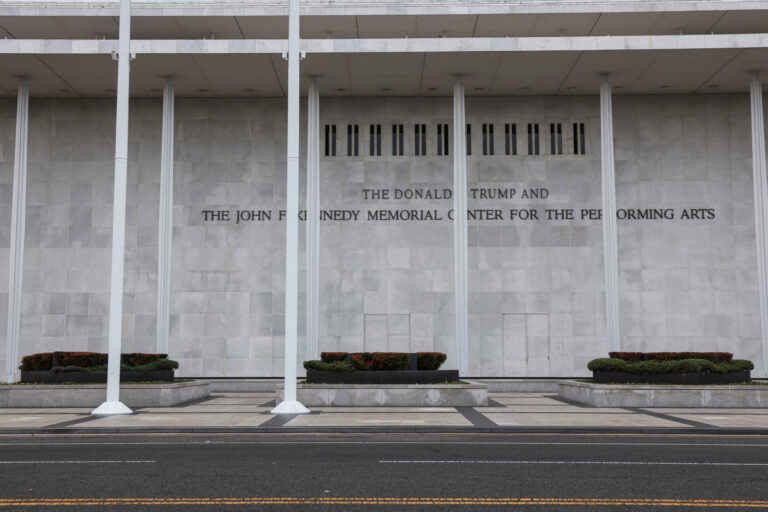Maestro Michael Tilson Thomas on music and mentoring amid a pandemic
Transcript
Notice: Transcripts are machine and human generated and lightly edited for accuracy. They may contain errors.
Judy Woodruff: A symphony requires all musicians playing their parts in harmony. COVID, of course, makes that delicate choreography all the more challenging.
Jeffrey Brown talks to maestro Michael Tilson Thomas about that, and passing the baton to a younger generation.
It’s part of our arts and culture series, Canvas.
Jeffrey Brown: Two musicians, one up-and-coming, the other a recognized master. And in the time of pandemic, their interaction is all remote.
Twenty-six-year old violist Stephanie Block.
Stephanie Block: One of my favorite excerpts that I learned is the Pas De Deux from “Giselle,” ballet “Giselle”.
Michael Tilson Thomas: It’s viola register. It’s what the viola was originally meant to play.
So, let’s hear it.
(MUSIC)
Jeffrey Brown: Her mentor? Michael Tilson Thomas, one of the world’s greatest conductors.
In March, Tilson Thomas was ending a 25-year run as conductor and music director of the San Francisco Symphony, when the COVID shutdown began.
Michael Tilson Thomas: It was a shock, kind of numbing at first, right in the middle of a rehearsal day, before we would start to tour to Carnegie Hall and Europe, say, well, guess what, it’s not happening, or some of it’s not happening.
And then, gradually, more and more of the tour wasn’t happening, and then the end of the year wasn’t happening.
Jeffrey Brown: The planned celebration of his tenure canceled, life and art interrupted by the reality of a deadly disease.
Michael Tilson Thomas: So, we came to the strange situation where metabolic beings as musicians are.
It wasn’t that get up in the morning, go to rehearsal, practice, get home, get a rest, and then go on and rev your metabolism up to its highest and around 10:30 at night, then go home, put yourself to sleep, and then do it the next day.
That’s the way we live. And, suddenly, that was all gone.
Jeffrey Brown: Instead, MTT, as he’s known, is using his time to lean into his craft, as musician, composer and mentor.
Tilson Thomas was born in Los Angeles into an artistic family. His grandparents were Yiddish theater stars. His father and mother both worked in the film industry. By 19, he was working with and conducting premieres by great composers like Stravinsky and Copland.
His big break came with the Boston Symphony, then London, and, finally, in 1995, San Francisco. In 1987, he founded Miami’s New World Symphony, the goal, an orchestral academy to prepare young musicians for professional careers, a bridge between conservatory training and a player’s first orchestral gig.
These days, he works remotely with symphony musicians like Georgia native Chelsea Sharpe.
Michael Tilson Thomas: Wow, you sound in absolutely great shape.
Jeffrey Brown: What have you seen in the young musicians you work with? How are they coping? How are they dealing with this year?
Michael Tilson Thomas: All the plans that they had, the auditions they were set to take, the new positions they were about to begin, the most creative time of their lives had to stop.
So, they had to look around and think, how can I reinvent myself? What else is there for me to do? How can I come out of this period being the best that I can be to go forward?
Jeffrey Brown: Here you are wanting to be in front of people, trying to get your — start a career and make a life as a musician. How hard has it been, and how have you coped with it?
Chelsea Sharpe: We finally had time to sort of reflect. And, personally speaking, I was grateful for that time to just sit with the instrument and maybe think about some things technically that I hadn’t had the luxury of time to kind of think about before.
Jeffrey Brown: A luxury Tilson Thomas believes they all need.
Michael Tilson Thomas: Normally, musicians are worried about, what is going to happen this weekend, the next concert and the next and the next and the next.
And now we’re in this period where we need to turn our attention just to, how are we slowly developing as musicians, as artists, and as people?
Jeffrey Brown: That’s just what Los Angeles native Corbin Castro has managed, creating an online music academy for children aged 8 to 12.
Corbin Castro: This is not necessarily the kind of French horn that we’re associating with Tchaikovsky.
Jeffrey Brown: Developed without prior connection to any youth music programs, and it’s all virtual.
Corbin Castro: It became very apparent to us the possibility that this program had to reach under-resourced students and provide technical training and super personalized mentorship in order to show them how classical music can have a positive influence, not just on their lives, but also the lives of the people in their communities.
Jeffrey Brown: Is this all pandemic-related, to start thinking this way in different terms about yourself as a musician and part of the community?
Corbin Castro: Yes, exactly. It kind of combined all the best parts of what music can offer and how music can enrich lives
Jeffrey Brown: Violist Stephanie Bloc agrees.
Stephanie Block: It’s the courage to take on something that challenges you as a player.
And then it’s the courage to kind of bare your soul again and give yourself to whoever needs it.
Jeffrey Brown: What future do you see for classical music, especially given the young people that you’re working with?
Michael Tilson Thomas: Well, all the young people I’m working with have a real commitment to sharing their music and their vision with people younger than they are, and, as a real life commitment, have taken on the role as a teacher in a very expanded way, not just in a studio, but over the Internet, in communities.
They’re much more dedicated to it. And I think the new ways that they’re going about this will bring great new things.
Jeffrey Brown: It’s a commitment tested and rediscovered during pandemic.
For the “PBS NewsHour” I’m Jeffrey Brown.
Judy Woodruff: Such a great story.
Support Canvas
Sustain our coverage of culture, arts and literature.



















